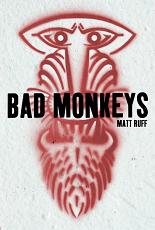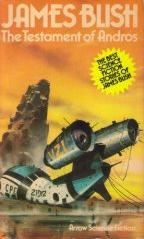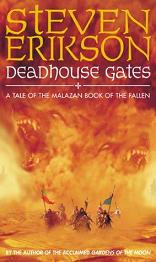Bad Monkeys — Matt Ruff

Bad Monkeys
Matt Ruff
230 pages
published in 2007
When your local library’s automated lending system refuses to recognise a book you’re attempting to borrow when it’s clearly there in front of you, it’s enough to make you a little bit paranoid, but when that book is Bad Monkeys, an example of American Paranoia at its finest, with a Christopher Moore quote on the cover saying “Buy it, read it, memorise then destroy it. There are eyes everywhere.“, you become more than a bit paranoid. Little did I know then how appropriate that little incident was. Bad Monkeys is one of those books that makes you look twice at every CCTV camera on your daily commute, not to mention much more innocent examples of street furniture for signs of hidden cameras.
You might know Matt Ruff from Sewer, Gas & Electric, his brilliant and hilarious parody-slash-update-slash-mixup of the stoner paranoia classic Illuminantus! trilogy, not to mention that bible of teenage libertarianism, Atlas Shrugged. If that novel showed Ruff’s absurdistic, bombastic side, Bad Monkeys is toned down, sleek and effortlessly cool. It still taps into that vein of essential American paranoia that also drove Sewer, Gas & Electric, but this time it’s more refined, less consciously wacky.
The Testament of Andros – James Blish

The Testament of Andros
James Blish
216 pages
published in 1973
James Blish was a science fiction writer of the same generation as Isaac Asimov, the first science fiction writers to have grown up with science fiction as a separate genre, to have become science fiction fans before they became science fiction writers. Blish’s first short stories were written in the early forties, before World War II interfered, so it was only in the fifties that he made his reputation. During that decade he wrote quite a few classic short stories and novels, including the Cities in Flight series, with its vision of New York flying off
amongst the stars and A Case of Conscience, in which a young Jesuit wrestles with the question whether or not the aliens he lives amongst posses souls. At the same time, writing under the pseudonym of William Atheling, Jr., he was one of the pioneers in applying literary criticism to science fiction. His later work is less interesting, being spend mostly on writing Star Trek novels.
Though Blish is an important early science fiction writer, one who has written several excellent novels and short stories, I’ve always found myself a bit lukewarm about him. I’ve read the novels I’ve mentioned above, attempted some other, later works of his, as well as most of his better known short stories; they were alright, but no more than that. Part of the trouble I had with him is that he, for a science fiction writer, had quite a conservative pessimistic atttitute towards the future, adhering to a Spenglerian, cyclical view of history, most notably in the Cities in Flight series. I got nothing against a bit of conservatism or pesssimism in my science fiction perse, even if I don’t share it, but Blish’s philosophy is a particularly dreary one.
Outer space linkage
Some quick links to interesting stuff today that don’t need their own post. First up, the annual Strange Horizons fund drive. Strange Horizons is an excellent science fiction/fantasy site, publishing fiction, poetry, reviews, etcetera, with the staff all volunteers but with paid contributors. I use the site quite a lot when doing science fiction or fantasy reviews for the booklog, as their reviewers usually have their heads screwed up straight and I’m always curious to see what they think of the book I’m reviewing.
The Guardian has an interview with noted science fiction writer and friend of the blog Charlie Stross, in which the following quote jumped out at me:
“Many science fiction writers are literary autodidacts who focus on the genre primarily as a literature of ideas, rather than as a pure art form or a tool for the introspective examination of the human condition,” he says. “I’m not entirely at ease with that self-description.” But with a background in biomedical and computer science rather than literature, his fiction always returns to science. “I just can’t help myself,” he explains. “I have a compulsive urge to use that background to build baroque laboratory mazes for my protagonists to explore, rather than being
content to examine them in their native habitat.”
That one paragraph explains so much about Charlie’s books.
Way back in February, Brad Hicks blogged about a Gerry and Sylvia Anderson’s live action science fiction series. No, not Space:1999, but UFO. When he described it, it sounded like it had provided a lot of the inspiration for the only computer game that ever gave me nightmares: UFO: Enemy Unknown (or X-Com 1 as it was also known), which I played a lot in
the mid-nineties. Finally having tracked down the DVD set of the series myself and watched the first episode, it does remind me a lot of X-Com. Of course, it’s quite dated, as it’s a 1969 idea of what the far flung future of 1980 would look like, full with men in Nehru suits smoking and drinking in the office while purple wigged women in silver miniskirts watched out for ufos on the moon, while their counterparts on earth wore tight jumpsuits, which showed cameltoe could be a problem in the future as well…
Oh no John Ringo!
I would just like to note Davind Hines’ delightfull takedown of John Ringo’s Paladin of Shadows series makes. If you don’t know Ringo, he’s one of an interchangable stable of authors writing the kind of formulaic mil-sf series Baen Books churns out by the dozen, featuring flint-eyed conservative he-men saving the world from alien menaces while spineless liberal appeaseniks are trying to stab them in the back. Those are bad enough already, both in content and writing, which is several rungs below David Weber, my personal bright red line below which I don’t bother, but this is much worse. A sample from the first chapter of the first book:
He knew that at heart, he was a rapist. And that meant he hated rapists more than any “normal” human being. They purely pissed him off. He’d spent his entire sexually adult life fighting the urge to not use his inconsiderable strength to possess and take instead of woo and cajole. He’d fought his demons to a standstill again and again when it would have been so easy to give in. He’d had one truly screwed up bitch get completely naked, with him naked and erect between her legs, and she still couldn’t say “yes.” And he’d just said: “that’s okay” and walked away with an amazing case of blue balls. When men gave in to that dark side, it made him even more angry then listening to leftist bitches scream about “western civilization” and how it was so fucked up.
It gets much worse and Hines is good at showing how bad it gets without getting the ick all over you, so to speak. What is it with Baen anyway? It’s not that they publish rightwing wankfests that I mind, it’s that several of their authors are decidedly creepy. There’s Krautman, who seems to think having the Waffen-SS star as heroes in one of his booksis no biggie, Leo Frankowski, who first presented a lighthearted rape in one of his intermibable Crosstime Engineer novels before moving to Russia because American women just didn’t understand a man’s needs and now Ringo and his not-quite rapist-hero and his collection of whores. To be sure not every rightwing Baen novelist is this batshit insane –David Weber might have some issues with liberals but seems quite sensible otherwise, while Eric Flint writes the same sort of mil-sf as the rest of them but featuring union members (he calls himself a Trotskist as well) — but there is a high percentage of outright nutters being published there.
Deadhouse Gates – Steven Erikson

Deadhouse Gates
Steven Erikson
941 pages
published in 2000
Deadhouse Gates is the second book in Erikson’s Malazan Book of the Fallen epic fantasy series of ten projected volumes. Whereas the previous volume, Gardens of the Moon had a severe case of everything but the kitchen sink plotting, this is much more focussed. Of course, it’s still a 900+ pages epic fantasy brick with several interlocking storylines, not all of which are wrapped up in this installment. You have to expect a certain amount of complexity.
This second book of the Malazan cycle takes place on a completely different continent from the first, with a largely new cast of characters, some of which are however related to the people we got to know in Gardens of the Moon. The central story revolves around a religious revolts on the subcontinent of the Seven Cities, one of the oldest conquests of the Malazan empire. For decades there has been a prophecy doing the rounds about the return of the Whirlwind, which would cleanse the Seven Cities and drive the Malazan out of the continent. Now it has started and most of the Seven Cities, apart from the capital of Aren have fallen.